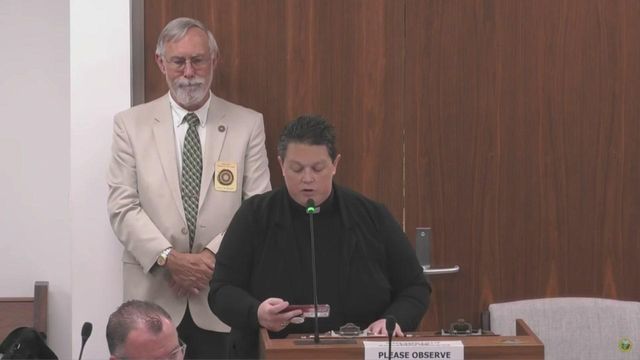Danny Bland: 1990 Teaching Fellow

This interview was conducted by email as part of a series on teacher diversity in North Carolina.
- Read the full series: NC's teacher diversity gap
- Read more interviews with other North Carolina Teaching Fellows
What years were you a Teaching Fellow, and what college did you attend?
1990-1994, North Carolina Central University
Why did you apply to be a Teaching Fellow, and how did the program affect your life?
I was influenced by a high school math teacher who told me that he thought I would be a perfect candidate for the program. I had previously had no interest in becoming a teacher but I had no idea what I really wanted to do, nor how I would pay for college. My teacher told me about the benefits of the program and how it would help me potentially reach some other life goals. The most appealing part about the program was that I could choose any subject and could go and teach in any part of the state to fulfill my obligation.
The program affected my life in more ways than I could possibly discuss within the confines of this message. It afforded me opportunities to step outside of my comfort zone and participate in experiences that I never imagined prior to going to college. I was able to travel and see different parts of the state and the country, and I was able to interact with peers from all over the state through enrichment experiences that built within us a sense of collegiality that I don't think can ever be replicated. I became the first in my family to graduate with a four year college degree and to be a part of any type of professional career field so that part of it has been huge not just in my life but in the lives of my younger siblings, their children, and even my own children.
What have you done since college, and what are you doing now?
I have worked in Education every since graduating from NCCU in 1994. I spent 7 years teaching in Durham, NC, and then went to work for the NC Teaching Fellows Program as the Coordinator of Summer Programs (6 years), and then Director of Recruitment (6 years). When the General Assembly decided to phase out the program in 2011, I stayed on the NCTFP staff and worked on efforts to save/restore the program for two years until my job was phased out in 2013. As my job was being phased out and I was thinking about what I wanted to do, my heart turned back to being in a classroom. I joined the staff at Heritage High School in August of 2013 and have been here every since.
Why have you stayed in (or left) teaching? I have remained committed to the profession of Education because of the passion instilled in me by the Teaching Fellows Program. The NC Teaching Fellows Program gave me a sense of purpose and made me feel as though I was "needed" so I have had a sense of mission ever since my early days as a Teaching Fellow at NCCU.
What advice do you have for colleges hoping to recruit more people of color and men to study teaching?
They must remain persistent even during times when it seems like their efforts aren't yielding much in terms of results. They also need to develop ways to frame the profession in a better light. Show that there are pathways to higher objectives within the profession i.e. becoming a department leader, a principal, and maybe even a system or state-wide administrator.
Continue to stress the importance of the need for males and minorities in education. They can help to lobby the legislature for to offer some incentives for choosing the profession such as reduced state tax rates, or subsidies for securing home and auto loans.
The colleges and universities can develop partnerships with faith-based groups and fraternities/sororities as well as civic organizations in communities that have higher populations of minority students to offer education about scholarships and programs that are available to help with the costs of college and teacher certification.
What advice do you have for schools hoping to retain people of color and men as teachers?
This is a tough one to address. A lot of what influences a person's decision to leave the profession comes from outside of the schools in which they work. A lot of it has to do with extra stress added to the profession by legislative mandates and restrictions/rules put into place by districts.
The creation of clearly defined pathways that allow for advancement within the profession may be a potential solution. No one likes to hear about teacher pay being a problem but in all honesty pay does heavily influence decisions that are often made about staying or leaving.
When I left it was to pursue what I thought was a once in a lifetime opportunity to give back to a program that meant so much to me in my growth and development, but make no mistake about it, the opportunity to earn a higher salary and relieve some of the financial stress on my family also was a factor in my decision.
Is there anything else you’d like to add?
The General Assembly made a mistake when they decided to dismantle the original Teaching Fellows Program. Although they have taken steps to correct that mistake, the current scholarship they offer doesn't go far enough in terms of putting back in place some of the mechanisms that made the original model work as well as it did. I wish that they would revisit the decision to restrict the certifications that current Teaching Fellows can pursue.
I believe that there does need to be consideration for people interested in pursuing areas where there is the greatest need but I don't think it should be the main focus. I also believe that the General Assembly underestimated the NCTFP's impact on teacher education in the state as a whole. They were laser-focused on the overall number of graduates the program put into the workforce but they missed the bigger picture of the numbers of people drawn into the pipeline because the existence of the program created an interest.
We had a statewide network of institutions, educators, and counselors working together to identify potential fits for the program, and then we were communicating with institutions within and outside of the program network to try and be sure that those targets had places to go whether they got the scholarship or not. I run into people all the time who tell me they applied for Teaching Fellows but didn't get it and continued to pursue education because they became aware of the opportunity to make a difference because of being recruited by the program.











